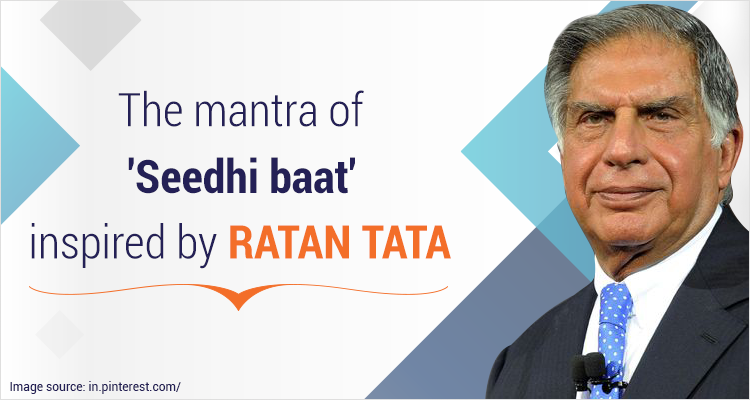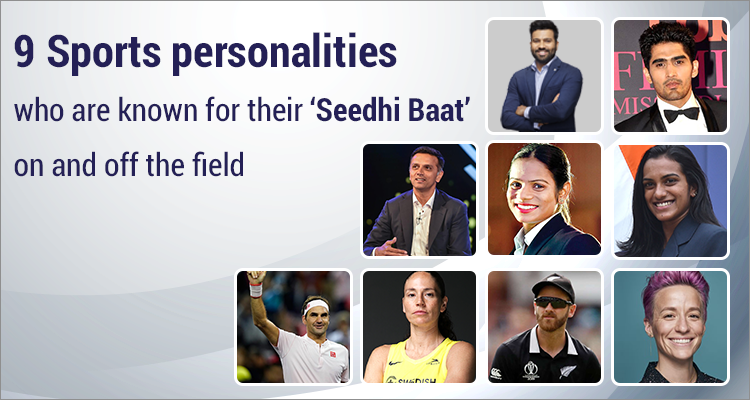Blog

The mantra of Seedhi Baat inspired by Ratan Tata: Wise, honest, and Straightforward – just how we like it!
Mythological tales with ‘Seedhi baat’
Build long lasting relationships in personal and professional life the "Seedhi Baat" way.
10 daily problems that can be solved by just doing ‘Seedhi Baat’
Reach greater heights in your business through the ‘Seedhi baat’ way
9 sports personalities that value honesty and transparency over everything else
Build long lasting relationships in personal and professional life the "Seedhi Baat" way.

Humans are social animals. We not only operate as individuals in a society, but also as communities and circles. Throughout the course of our lives, we meet people and go on to build many different relationships. While they enrich our life experiences, relationships also are a constant source of learning. It is important to maintain healthy relationships in both personal and professional spheres for your personal growth. And as people leave their imprint on us, we also leave an impression on them.
One of the key ingredients of any lasting relationship is honest communication. Being open and transparent about one's emotions, motives, doubts, and opinions helps build a sense of trust between all parties. It also makes one recognized as a person of integrity- as someone who is known for their "Seedhi Baat".
The process of leading a life of honesty and integrity is simple, but requires consistency. Small positive changes turn to positive habits before you know it. The best part? It’s never too late to start, you can start working towards it today. Here are a few ways in which you can build long lasting relationships in personal and professional life by doing the "Seedhi Baat" :
- Don't be afraid to say "No"
We are often hesitant to say ‘no’ in situations where the other person expects us to say ‘yes’. It is important to be cognizant of what your preferences and priorities are, and draw a polite boundary. If you keep silently crossing these boundaries in your relationships, it will only lead to exhaustion on your part and tension in the long run.
- Deliver on your promise
Once you make a commitment, remember to see it through. Be it a personal or a professional promise, it is your responsibility to fulfill it to the best of your ability. If for some reason you are unable to do the same, be upfront and honest about your reasons. It is best for any relationship, if the other person is communicated the "Seedhi Baat" instead of being lied to.
- Avoid any lies
All of us are guilty of telling small lies or white lies to save a complicated situation, or to simply be polite. Small lies require other lies to be supported by, and soon enough it gets difficult to remember all the inconsistent details. Being honest might not save you from an ongoing sticky situation, but it will save you the hassle of keeping up those lies long after it has passed. Stop yourself when you come up with small lies to diffuse an awkward situation.
- Agree to disagree
Respectful disagreements are a sign of emotional maturity. All of us are unique in our perspectives and experiences, which is why there exists the scope to disagree with a person about certain matters. Disagreements do not mean that you can no longer have a cordial relationship. You can acknowledge someone's view while sticking to your own. One must learn to respect each other’s views without being rude or hurting the bond.
- Listen
Honesty isn't always about speaking what's right. It also involves attentive listening and observing. Instead of building a response in your head while the other person is talking, try to listen and understand their perspective. Only after processing it, will you be able to give an honest response. This leads to meaningful engagement and improves the quality of any conversation.
- Surround yourself with people who do "Seedhi Baat"
The company we keep and the people we surround ourselves with on a day-to-day basis influence us to a great extent. It is crucial to choose friends that you can trust to tell you the truth. In the professional sphere, it helps to spend more time with colleagues and mentors who are clear and straightforward in their approach.
- Provide constructive criticism
Constructive criticism is vital for growth. If your friend's cake needs less baking soda, be comfortable enough to be able to frankly say that. If you think something isn't working in a project, express it constructively, possibly with a proposed solution. Avoid false consolation that might hinder someone's learning process or the overall growth of your team. Easier said than done, but one must learn this trick of effectively providing feedback without being harsh or abruptly rude.
- If you dish it, you should also take it
Sometimes the "Seedhi Baat" can be difficult to accept. When presented with criticism, it is only natural to get defensive. Instead, be sure to honestly evaluate whether it is constructive or not. If it is, then spare no time in accepting the criticism and making the requisite amends. And if it's not constructive for your endeavours or yourself, then it is wiser to ignore it.
Aug 30, 2020 | 18:00 PM

The mantra of Seedhi Baat inspired by Ratan Tata
Jan 29, 2021 | 17:00 PM

Mythological tales with ‘Seedhi baat’
Oct 15, 2020 | 17:00 PM

Build long lasting relationships in personal and professional life the "Seedhi Baat" way.
Aug 30, 2020 | 18:00 PM

10 daily problems that can be solved by just doing ‘Seedhi Baat’
Aug 30, 2020 | 18:00 PM

Reach greater heights in your business through the ‘Seedhi baat’ way
Aug 30, 2020 | 18:00 PM

9 sports personalities that value honesty and transparency over everything else
Jan 30, 2021 | 18:00 PM


